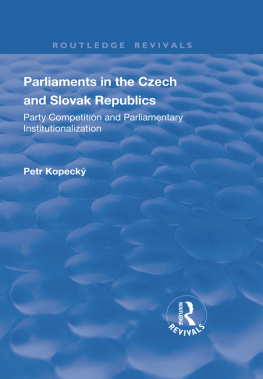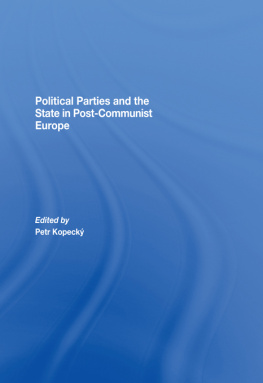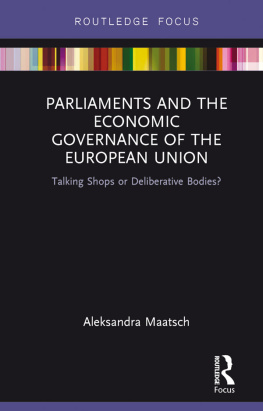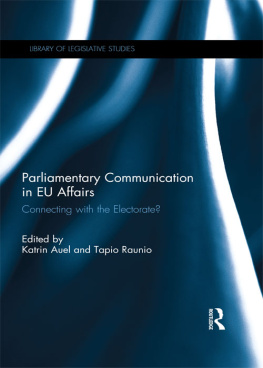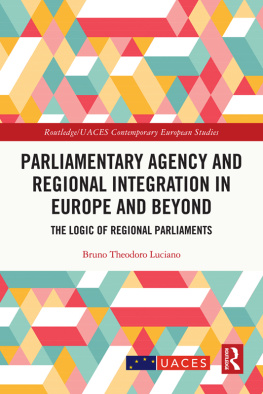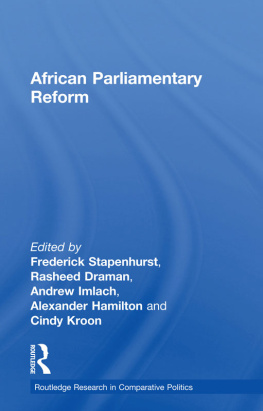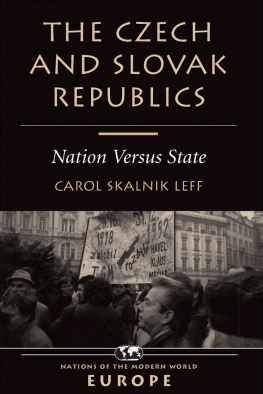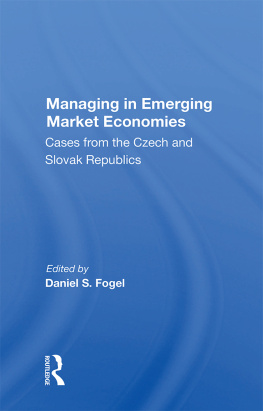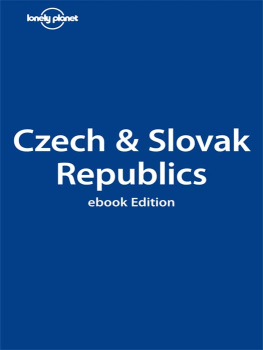Parliaments in the Czech and Slovak Republics
To Tineke
First published 2001 by Ashgate Publishing
Reissued 2018 by Routledge
2 Park Square, Milton Park, Abingdon, Oxon OX14 4RN
711 Third Avenue, New York, NY 10017, USA
Routledge is an imprint of the Taylor & Francis Group, an informa business
Copyright Petr Kopeck 2001
All rights reserved. No part of this book may be reprinted or reproduced or utilised in any form or by any electronic, mechanical, or other means, now known or hereafter invented, including photocopying and recording, or in any information storage or retrieval system, without permission in writing from the publishers.
Notice:
Product or corporate names may be trademarks or registered trademarks, and are used only for identification and explanation without intent to infringe.
Publishers Note
The publisher has gone to great lengths to ensure the quality of this reprint but points out that some imperfections in the original copies may be apparent.
Disclaimer
The publisher has made every effort to trace copyright holders and welcomes correspondence from those they have been unable to contact.
A Library of Congress record exists under LC control number: 2001086239
ISBN 13: 978-1-138-70299-8 (hbk)
ISBN 13: 978-1-315-20339-3 (ebk)
The establishment and consolidation of democracy in contemporary Eastern Europe is proving both problematic and arduous. The postcommunist totalitarian legacy appears much less favourable for successful democratization than the legacy left by non-democratic regimes in Southern Europe and Latin America. In addition to combatting severe social and economic problems caused by the hitherto unprecedented transformation from a centrally planned economy to a market one, political leaders in Eastern Europe have been simultaneously engaged in the process of establishing the rules, procedures and norms which should sustain the institutional structures within which democracy is to function. This book is primarily concerned with examining these political-institutional problems in two East-Central European countries: the Czech and Slovak Republics. In particular, the book explores and evaluates the process of parliamentary institutionalization and, by doing so, also explores and evaluates a broader process of democratic consolidation in both countries. It intends not only to fill a void in the research on parliaments in the Czech and Slovak Republics, but also to contribute to studies of democratization in general, and to cross-national legislative studies in particular.
The book provides a comparative analysis of the Czech and Slovak parliaments - Parlament (Poslaneck Snmovna a Sent) in the Czech Republic and Nrodn Rada in Slovakia - with the main empirical focus on their first and partly on their second legislative terms (1992-1998). It shows the development of these two parliaments in their full political contexts. It views parliaments not so much as institutions on their own, as rather as arenas within which other major political actors, such as political parties or interest groups, interact. Parliaments are seen as an important partial regime of a new political system, which encompasses a wide range of institutions, rules, procedures, and political organizations, and around which crucial questions of political style, legitimacy and democratic accountability revolve. The book is organized so as to analyze parliaments both in their relations with polity (both the electorate and other state institutions, such as governments and presidents), and in their internal functioning (role of individual MPs, parliamentary parties and parliamentary committees). In addition, it also offers an interesting perspective on two relatively understudied countries which appear to differ substantially in the way in which parliamentary institutionalization and democratic consolidation have developed, yet which both started with a more or less identical institutional design and a similar social, economic and political environment.
The book originates from a comparative project - The Institutionalization of Parliamentary Democracy in Poland, Hungary, the Czech Republic and Slovakia - carried out in the Department of Political Science of Leiden University. The project was set up as a comparative study. However, it was not set up as a single study, executed by a single person, or tied to a single analytical framework. Rather, the project was an umbrella under which three distinct (case) studies were undertaken, each carried out by a single person completing a PhD. thesis, but connected by a set of common themes and broadly defined questions. A common questionnaire was developed within the project, with the aim of conducting interviews with parliamentarians in all countries researched, gathering cross-nationally comparable data. The core data for this book is thus derived from a unique set of structured interviews with large samples of parliamentarians in the Czech and Slovak Republics, which were conducted in 1993 and 1994 (see Appendix labout the survey). These interviews are complemented by data derived from the study of both primary and secondary sources, involving material on constitutions, formal parliamentary and party rules and procedures and so forth, as well as additional interviews with MPs, party leaders and activists which I conducted in both countries.
The books contribution to both comparative legislative studies, and to the studies of democratization in Central and Eastern Europe, centers around three key issues. First, it shows that parliamentary institutionalization is not so much determined by different configurations of formal institutional procedures but rather by their comformity with the values and expectations of political actors who act within them. Second, it substantiates the importance of democratization theories working with assumptions of elite and political autonomy. Third, it refutes the three oft-cited broad explanations - economic, cultural, and institutional - for the differences in parliamentary institutionalization and democratic consolidation between the Czech and Slovak Republics, instead offering a more complex explanation based on the understanding of the (different) nature of party competition in these two countries.
A number of institutions and people helped me to bring the study to this point. To start with my research would have been impossible on such a scale without generous financial support from the Dutch Organization for Scientific Research (NW0), which I gratefully acknowledge. Within the project and the Department of Political Science of Leiden University, I greatly benefited from the guidance and insightful comments of Rudy Andeweg and Peter Mair, as well as from my collaboration with Heleen den Haan, Ania van der Meer, Marc van den Muyzenberg and Ingrid van Biezen. In the Czech Republic, my thanks go to Jan Herzmann and his team, as well as to Pavel Hubek and Petr Plecit. In Slovakia, I am indebted to Darina Malov and her students of politics from the Comenius University, as well as to Danica Sivkov and Peter Ue. At Sheffield University, I would particularly like to thank Jean Grugel, Martin Smith and all the office staff at the Department of Politics, as well as to Neil Bermel, from the Department of Russian and Slavonic Studies.
My friend and academic colleague Cas Mudde deserves a special mention, for his help, entertainment and company ever since we met in Leiden. Throughout all these years, he uncomplainingly read many drafts of my work and discussed any problems. He also provided me with a lot of encouragement. Finally, I wish to express my many thanks to Tineke Griffioen. She suffered through an endless series of deadlines and worries about the book. But perhaps most importantly, her presence and understanding helped me to put my academic career in a healthy perspective. I would like to dedicate this work to her.

